So, I've been looking at publishing from a decidedly last decate point of view. Partially because the first research I did was, well, in the 90's. I've found my gurus, and the people I trust, and lacking much in the way of other expertise, I've followed them: get an agent, they'll get you a publisher, and off you go.
That's changing, though.
I'm finishing up my second solo book. And it's a good book. When I began writing, self-publishing was the way to go for those who had given up on the publishing game. Who couldn't navigate the game well enough to
That's changing. Read Glen Krisch's guest blog on Brian Keene dot com. I'll wait.
Now, Glen is exceptional in that he has been an editor, so he's clearly ahead of most people in the writing game. He's got sterling prose, just read his blog entry. It's an interesting read, moves along quickly, and unlike this blog, has no typos.
The thought of freedom is seductive. While I doubt sales of my books are going to keep me afloat without another job, it mught be a good start. And I could continue the series I have wanted to much to write. But there's stuff to consieder: having an editor look at the work, getting a cover, making sure it is as polished as it can possibly be, and then promoting it.
How the hell do you promote an e-book? Well, that's something I'm going to have to research.
I'm really scared. If I don't put out the best book I can, I might not find my readership, and I desperately want readers. I think I'm saying a thing or two that people want to hear, even need to hear. And if I self-publish, it's all going to be on my head to get it the hell done.
On the other hand, I might just ring the cherries.
I'm going to look at traditional, small publishers who have decent track record before I really investigate self-pub route. There are still a lot of rip-offs out there. But I think my current novel is strong enough that it will catch someone's attention. But now I have a backup plan. And strangely, that makes me feel more secure.
The personal blog of John Goodrich, including, but not limited to kaiju film and comics involving swamp creatures.
Friday, June 22, 2012
Tuesday, June 12, 2012
My Complex Relationship With Reviews...
Conventional wisdom is that when a writer gets a positive review, it's because they have earned it. When we get a negative review, it's because the reviewer is some sort of whackjob with an axe to grind, or just didn't 'get' the story. So feel the love from positive feedback, and let the negative ones just slide off your back.
The truth is that my relationship with reviews is a lot more complex than that. We always read the reviews. The writer who does not either has too many reviews to read, or they have antifreeze for blood. Either way, they are people to be feared and respected.
Everyone gets bad reviews. My best negative review is from Amazon, concerning "Captains of Industry" from Cthulhu's Dark Cults which says "'Captains of Industry' left me feeling like a few pages were missing. Lots of union rhetoric (all good), and a few 'who are these guys and what are they doing' issues, but nothing chilling. I was confused as to why this had been written, as it seemed to have no overall point or connection to the cthulhu concept. Yes, union busters and early industrialists were bad news at times, but this left me confused." And a part of me says "He didn't get it." Another part says "I should have made the connection to the Mythos more clear. And maybe there was a bit too much Socialist rhetoric for a horror story." But the story is out, and there's no way to revise it now.
On the other hand, Brian Keene praised the anthology and the story on his blog. I'll take Keene's praise over just about anyone else's. And certainly over most peoples' criticism. I've met the man, and he is a straight-talker. When he reviews his reading material, he is not thinking about whether I'm going to like (or, in this case, be over the moon) his review. He's thinking about what he read from the standpoint of someone who has read a HUGE amount. And writes a lot.
So I have two very different opinions of the same story. I can either tie myself up in knots by trying to reconcile the two, or I can think to myself "Hey, I pleased a reader whose opinion I respect, so I must be doing something right." And that's how I tend to look at positive reviews; I made a connection with someone who thought enough of the story to tell other people.
Part of the reason I bring this up is because I just received an enormously positive review of "Not an Ulcer" in the NEHW's Epitaphs Specifically, the reviewer likes my story more than anyone else's, and says so.
Now, I've read Epitaphs. It contains stories by Christopher Golden, Rick Hautula, and Peter Dunbar, all of whom are heavy hitters in the horror community. They're excellent, polished, professional writers, and their stories are, in every measurable way, better than mine.
I'm not just saying that because I respect them, or I've met them. I'm saying it because it's as true as a summer day is long. Their stories were better, and it would take someone like Stephen Hawking or Umberto Eco to sway my opinion. The chance I'm ever going to say to anyone "Hey, someone thought my story was better than Chris Golden's" is ZERO. Because his story was better than mine.
At the same time, the story clearly connected with the reader. It seems like I adequately conveyed my concept. And I'm glad they liked it.
The truth is that my relationship with reviews is a lot more complex than that. We always read the reviews. The writer who does not either has too many reviews to read, or they have antifreeze for blood. Either way, they are people to be feared and respected.
Everyone gets bad reviews. My best negative review is from Amazon, concerning "Captains of Industry" from Cthulhu's Dark Cults which says "'Captains of Industry' left me feeling like a few pages were missing. Lots of union rhetoric (all good), and a few 'who are these guys and what are they doing' issues, but nothing chilling. I was confused as to why this had been written, as it seemed to have no overall point or connection to the cthulhu concept. Yes, union busters and early industrialists were bad news at times, but this left me confused." And a part of me says "He didn't get it." Another part says "I should have made the connection to the Mythos more clear. And maybe there was a bit too much Socialist rhetoric for a horror story." But the story is out, and there's no way to revise it now.
On the other hand, Brian Keene praised the anthology and the story on his blog. I'll take Keene's praise over just about anyone else's. And certainly over most peoples' criticism. I've met the man, and he is a straight-talker. When he reviews his reading material, he is not thinking about whether I'm going to like (or, in this case, be over the moon) his review. He's thinking about what he read from the standpoint of someone who has read a HUGE amount. And writes a lot.
So I have two very different opinions of the same story. I can either tie myself up in knots by trying to reconcile the two, or I can think to myself "Hey, I pleased a reader whose opinion I respect, so I must be doing something right." And that's how I tend to look at positive reviews; I made a connection with someone who thought enough of the story to tell other people.
Part of the reason I bring this up is because I just received an enormously positive review of "Not an Ulcer" in the NEHW's Epitaphs Specifically, the reviewer likes my story more than anyone else's, and says so.
Now, I've read Epitaphs. It contains stories by Christopher Golden, Rick Hautula, and Peter Dunbar, all of whom are heavy hitters in the horror community. They're excellent, polished, professional writers, and their stories are, in every measurable way, better than mine.
I'm not just saying that because I respect them, or I've met them. I'm saying it because it's as true as a summer day is long. Their stories were better, and it would take someone like Stephen Hawking or Umberto Eco to sway my opinion. The chance I'm ever going to say to anyone "Hey, someone thought my story was better than Chris Golden's" is ZERO. Because his story was better than mine.
At the same time, the story clearly connected with the reader. It seems like I adequately conveyed my concept. And I'm glad they liked it.
Friday, June 8, 2012
Ra Was a Jerk!
Because I'm that nerd, I like to read translations of ancient manuscripts. If I was a real wonk, I'd be learning languages to get the real flavor of the text, but that's not going to happen. Except maybe with Old English.
Anyway, I've been reading the rather delightful Raymond Faulkner translation of the Ancient Egyptian Book of the Dead (or the Book of Coming Forth By Day, if you're more of an Egyptian nerd that I am). It's a pleasant translation, with color pictures of various papyrii makes it a pleasant read.
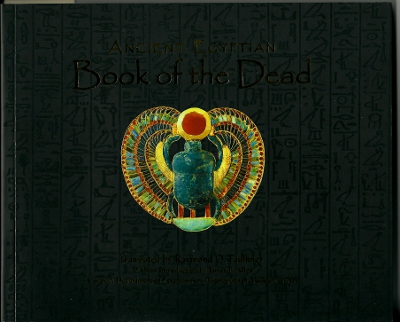
It's pretty common knowledge that the Egyptian Gods were pretty pleasant to the Egyptians. They had regular seasons, and the Nile's live-giving floods were mostly gentle. Unlike the Mesopotamians, whose gods were capricious at best, partially because the flooding of the Tigris and the Euphrates were highly variable, and could turn deadly without warning.
I'm beginning to question the Egyptian Gods' overall benevolence, as I read the Book of the Dead. It's is a collection of a hundred and eighty-nine spells intended to give the recipient a pass to the pleasant afterlife, as opposed to the bad one. There's a spell to ward off hostile crocodiles, one to transform the recipient into a heron should he so wish, and spells to demonstrate to the gods that the recipient is justified, and so should be able to go to the Field of Reeds.
However, there's a recurring theme that's more than a little disturbing. Spell 102, "For Going Aboard the Bark of Ra":
"O you who are great in your bark, bring me to your bark, so that I may take charge of your navigating in the duty which is alloted to one who is among the Unwearying Stars."
Sounds good so far, right? The Justified individual wants to get to be on Ra's boat, and help with the navigation. Which, hey, at least he's not asking to laze around and be a nuisance when everyone else is fighting off various demons of darkness. But there's a kicker in the very next line:
"What I doubly detest, I will not eat; my detestation is feces, and I will not eat it. I will not consume excrement, I will not approach it with my hands."
WOAH! Man, Ra is a jerk. Luxury all the way, taking control of the Bark that is the Sun, but if you don't say this spell, he's going to feed you shit for the rest of eternity? What kind of food service is there on that thing, anyway? It sounds suspiciously like one of those contracts written where anything not specified is supplied at absolute minimum. "Haw Haw!" laughs the God of the Sun. "You didn't say anything about provisions, so here's a big plate of poo!"
What a jerk.
Anyway, I've been reading the rather delightful Raymond Faulkner translation of the Ancient Egyptian Book of the Dead (or the Book of Coming Forth By Day, if you're more of an Egyptian nerd that I am). It's a pleasant translation, with color pictures of various papyrii makes it a pleasant read.

It's pretty common knowledge that the Egyptian Gods were pretty pleasant to the Egyptians. They had regular seasons, and the Nile's live-giving floods were mostly gentle. Unlike the Mesopotamians, whose gods were capricious at best, partially because the flooding of the Tigris and the Euphrates were highly variable, and could turn deadly without warning.
I'm beginning to question the Egyptian Gods' overall benevolence, as I read the Book of the Dead. It's is a collection of a hundred and eighty-nine spells intended to give the recipient a pass to the pleasant afterlife, as opposed to the bad one. There's a spell to ward off hostile crocodiles, one to transform the recipient into a heron should he so wish, and spells to demonstrate to the gods that the recipient is justified, and so should be able to go to the Field of Reeds.
However, there's a recurring theme that's more than a little disturbing. Spell 102, "For Going Aboard the Bark of Ra":
"O you who are great in your bark, bring me to your bark, so that I may take charge of your navigating in the duty which is alloted to one who is among the Unwearying Stars."
Sounds good so far, right? The Justified individual wants to get to be on Ra's boat, and help with the navigation. Which, hey, at least he's not asking to laze around and be a nuisance when everyone else is fighting off various demons of darkness. But there's a kicker in the very next line:
"What I doubly detest, I will not eat; my detestation is feces, and I will not eat it. I will not consume excrement, I will not approach it with my hands."
WOAH! Man, Ra is a jerk. Luxury all the way, taking control of the Bark that is the Sun, but if you don't say this spell, he's going to feed you shit for the rest of eternity? What kind of food service is there on that thing, anyway? It sounds suspiciously like one of those contracts written where anything not specified is supplied at absolute minimum. "Haw Haw!" laughs the God of the Sun. "You didn't say anything about provisions, so here's a big plate of poo!"
What a jerk.
Wednesday, June 6, 2012
Hurrah for Good Reviews!
You know, there's very little that brings up my mood better than a good review. That ininimitable web resource, Horror World, has just published a very positive review of Nightmare Cities: Urban Cthulhu, and that's a wonderful thing. Congratulations to everyone who plkaced in this anthology, and definite thanks to Brian Sammons for telling everyone how much he liked it.
I've also met my writing goal for this morning, so I think it may be time for a trip to the comic book store.
I've also met my writing goal for this morning, so I think it may be time for a trip to the comic book store.
Friday, May 25, 2012
It's Been a Week! What Have I been Up To?
Who's a bad blogger who hasn't updated in a week? Yes, that would be me.
That said, I got both short stories off, (one has already been accepted, but it's Sekrut until I am given the green light). With those done, I was thinking about writingt a story for Cthulhurotica II, but I've just been itching to get back to the novel I put down a year and a half ago. And yes, it's bad to stop writing a novel, but I was back in school and all of my time and much of my brain was eaten by Chemistry.
I love writing this novel. I started it because I overall dislike its genre, and decided to find a way to make it my own. Could I write a novel about something I didn't love? The answer, at 57,000 words, is yes. And novels give the writer a chance to breathe, to expand on their ideas, keeping an eye on the pace, but without the intensive crunch and relentless word-counting of short stories. I still like writing shorts, but there's a liberty to a novel that lets me really develop character and plant foreshadowing and become very complex. Of course, I'll have to sell said novel, and that'll be a good indicator as to whether I was successful.
I've been having fun (and a bit of frustration) with the 20-year old Red Baron game. My reviews of pre-1990 WWI flight games are all done, and I'm wondering if I should blog them, or just make a new section of my website. Unfortunately, playing and writing about premodern flight sims is scratching my nonfiction writing itch, which is cutting into my blogging.
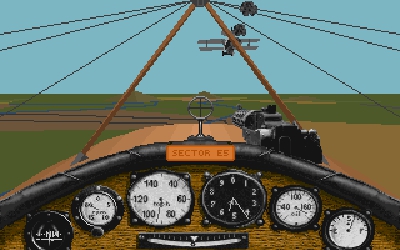
I've just torn through a novel, the first time I've done this for some time. Three Cheers for Me is the first of a series of comedy novels about a Canadian flier in WWI. The Bandy Papers series is sort of a combination of Wodehouse's Bertie Wooster and W.E. Johns' Bigglesworth, goofy social novels, uniquely Canadian, with the protagonist flying about in a Camel. I plan on getting the next couple of novels (until the end of the Great War) at least.
And it's time, past time, to get my shorts back out on the market. I've got a number of shorts that have not sold, that I think can sell, but haven't had the time or inclination to put out there. I'm thinking about saving "Nicaragua 1986" for Shroud magazine, partially because I want to appear under the same cover as Brain keene. But "Three Dreams" "Too Short For an Angel" and "Ultra-Fast Delivery" all need to get sold.
That said, I got both short stories off, (one has already been accepted, but it's Sekrut until I am given the green light). With those done, I was thinking about writingt a story for Cthulhurotica II, but I've just been itching to get back to the novel I put down a year and a half ago. And yes, it's bad to stop writing a novel, but I was back in school and all of my time and much of my brain was eaten by Chemistry.
I love writing this novel. I started it because I overall dislike its genre, and decided to find a way to make it my own. Could I write a novel about something I didn't love? The answer, at 57,000 words, is yes. And novels give the writer a chance to breathe, to expand on their ideas, keeping an eye on the pace, but without the intensive crunch and relentless word-counting of short stories. I still like writing shorts, but there's a liberty to a novel that lets me really develop character and plant foreshadowing and become very complex. Of course, I'll have to sell said novel, and that'll be a good indicator as to whether I was successful.
I've been having fun (and a bit of frustration) with the 20-year old Red Baron game. My reviews of pre-1990 WWI flight games are all done, and I'm wondering if I should blog them, or just make a new section of my website. Unfortunately, playing and writing about premodern flight sims is scratching my nonfiction writing itch, which is cutting into my blogging.

I've just torn through a novel, the first time I've done this for some time. Three Cheers for Me is the first of a series of comedy novels about a Canadian flier in WWI. The Bandy Papers series is sort of a combination of Wodehouse's Bertie Wooster and W.E. Johns' Bigglesworth, goofy social novels, uniquely Canadian, with the protagonist flying about in a Camel. I plan on getting the next couple of novels (until the end of the Great War) at least.
And it's time, past time, to get my shorts back out on the market. I've got a number of shorts that have not sold, that I think can sell, but haven't had the time or inclination to put out there. I'm thinking about saving "Nicaragua 1986" for Shroud magazine, partially because I want to appear under the same cover as Brain keene. But "Three Dreams" "Too Short For an Angel" and "Ultra-Fast Delivery" all need to get sold.
Thursday, May 17, 2012
We Will Only Pass This Way Once...
If you've got sharp eyes and pay attnetion to details, you will notice that there's a story in the 'published' section of this blog that is not on my web page. "Death on the American Family Farm" was sold to Undead Press's anthology Book of the Dead, one of several presses run by Anthony Giangregorio. Anthony has been at the center of some controversy recently, and I think it's time I weighed in on this.
The critics, including Brian Keene, Nick Mamatas, and several people who Anthony has bought stories from, are right. Undead press and Anthony Giangregorio are ignorant, unethical publishers that I wouldn't to go near if they offered ten cents a word.
Ultimately, this is my own damn fault. I was just starting out, I was looking for a sale to boost my ego, so I sent a story off to a penny-a-word publication. And I got in. And that was the beginning of my trouble.
Giangregorio called me. On the phone. Helpful hint to gentle readers; if you have Brooklyn accent, people will already thing you're a used-car salesman. Trying to hustle them by asking if they have any other stories is a big put-off. So when he asked, I said I didn't. Which was a lie, but I felt like I was getting hustled. Which, it turned out, I was.
The Book of the Dead was published, and immediately came under attack. In those days, I hung out at the Shocklines forum, where a lot of horror professionals (and a few schmucks) talk shop. John Skipp, co-edtor of the seminal 80's Book of the Dead objected to Undead Press's use of his title. Like a real pro, Giangregorio got defensive, pointing out that you cannot copyright a title, and was really rude to the person he claimed the anthology was an homage to (See Nick Mamatas' documentation of this on his blog.
A few days later, it came to light that Giangregorio had used characters from the Dawn of the Dead, which is an enormous copyright no-no, and also completely frikking stupid.
I don't think that the illustrious Mr.Giangregorio messed with my story, but by the time I had one in my hands, I was already too embarassed to read it. I have a single copy, and it's not even in my personal collection of my work. I won't give him a blessed dime. It seems like he's getting worse, no longer content to merely suck, he's inserting bestiality and bad grammar into stories he's bought. See Brain Keene's blog for this sack of crap.
Be smart. Know your publisher, and if somethig smells fishy, it probably is. The reek of something like this is very hard to wash off, even if everyone else has forgotten about it.
Now, let's never talk about this again.
The critics, including Brian Keene, Nick Mamatas, and several people who Anthony has bought stories from, are right. Undead press and Anthony Giangregorio are ignorant, unethical publishers that I wouldn't to go near if they offered ten cents a word.
Ultimately, this is my own damn fault. I was just starting out, I was looking for a sale to boost my ego, so I sent a story off to a penny-a-word publication. And I got in. And that was the beginning of my trouble.
Giangregorio called me. On the phone. Helpful hint to gentle readers; if you have Brooklyn accent, people will already thing you're a used-car salesman. Trying to hustle them by asking if they have any other stories is a big put-off. So when he asked, I said I didn't. Which was a lie, but I felt like I was getting hustled. Which, it turned out, I was.
The Book of the Dead was published, and immediately came under attack. In those days, I hung out at the Shocklines forum, where a lot of horror professionals (and a few schmucks) talk shop. John Skipp, co-edtor of the seminal 80's Book of the Dead objected to Undead Press's use of his title. Like a real pro, Giangregorio got defensive, pointing out that you cannot copyright a title, and was really rude to the person he claimed the anthology was an homage to (See Nick Mamatas' documentation of this on his blog.
A few days later, it came to light that Giangregorio had used characters from the Dawn of the Dead, which is an enormous copyright no-no, and also completely frikking stupid.
I don't think that the illustrious Mr.Giangregorio messed with my story, but by the time I had one in my hands, I was already too embarassed to read it. I have a single copy, and it's not even in my personal collection of my work. I won't give him a blessed dime. It seems like he's getting worse, no longer content to merely suck, he's inserting bestiality and bad grammar into stories he's bought. See Brain Keene's blog for this sack of crap.
Be smart. Know your publisher, and if somethig smells fishy, it probably is. The reek of something like this is very hard to wash off, even if everyone else has forgotten about it.
Now, let's never talk about this again.
Labels:
errors,
Keene,
Mamatas,
politeness,
words under covers,
writing
Monday, May 14, 2012
The Learning Curve...
It's a known fact that the Sopwith Camel killed more pilots in trainng than were shot down flying it. And I've just spend an hour and a half training to learn a tempermental, difficult-to-fly biplane. And this is what is referred to as a steep learning curve. NO, I didn't crash these planes deliberately for the picture. YES, I'm still playing on novice.
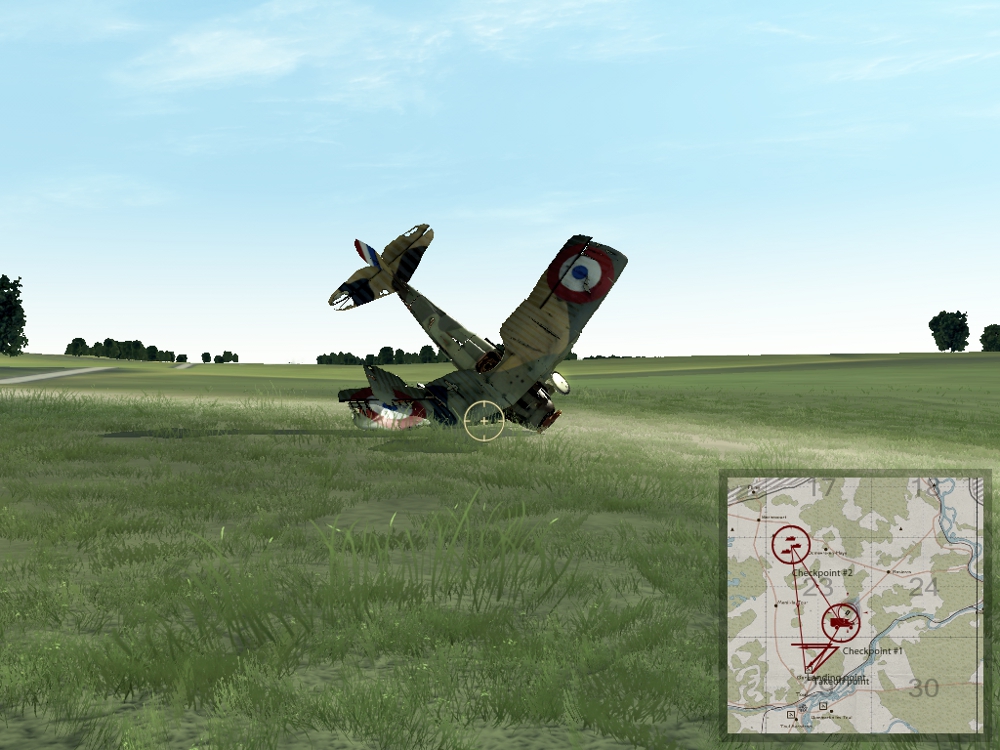
Failure to pull up after a strafing run.
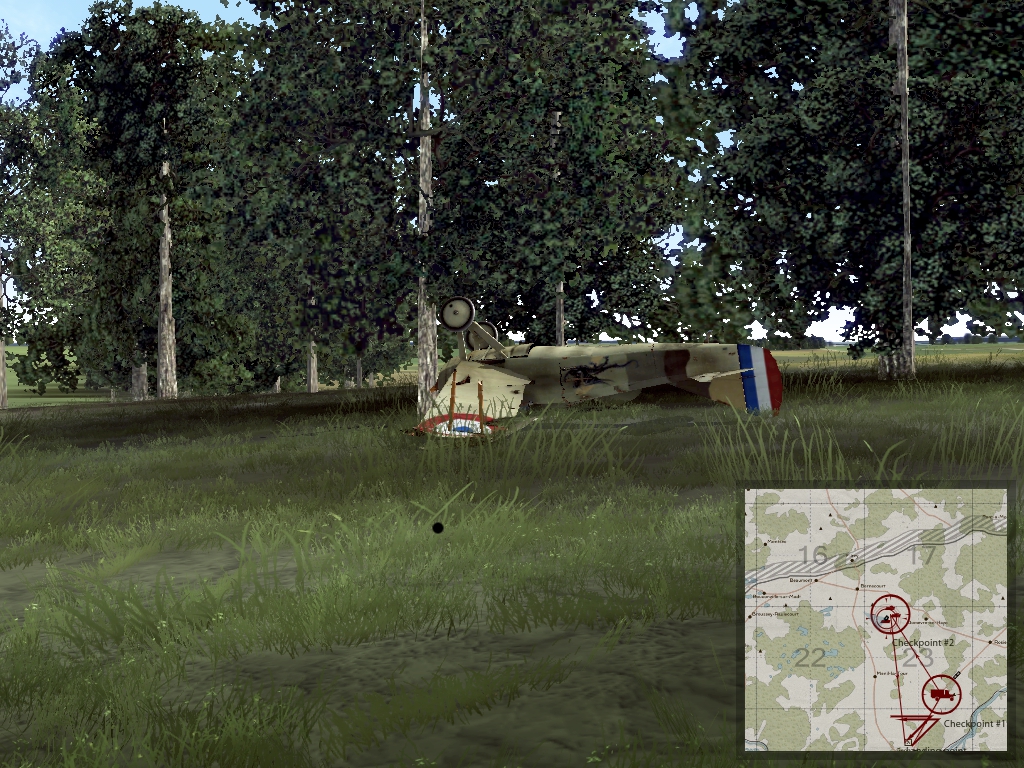
Thwacking a tree during a low-level strafe.
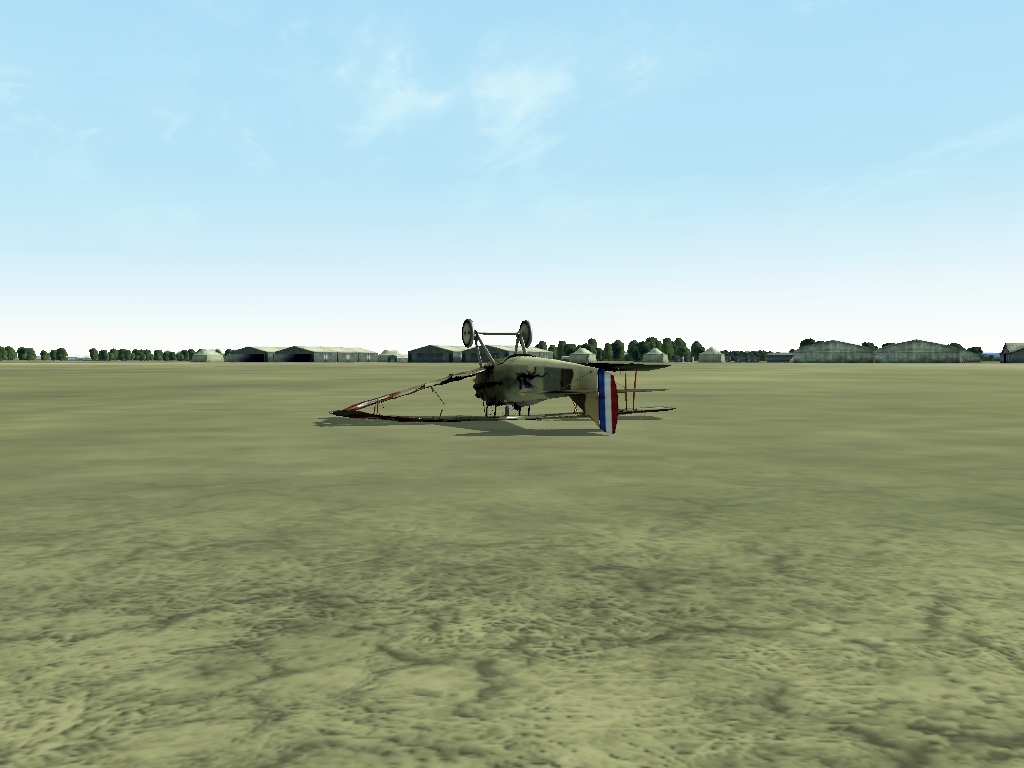
What happens when I fail to gain altitude during take off.
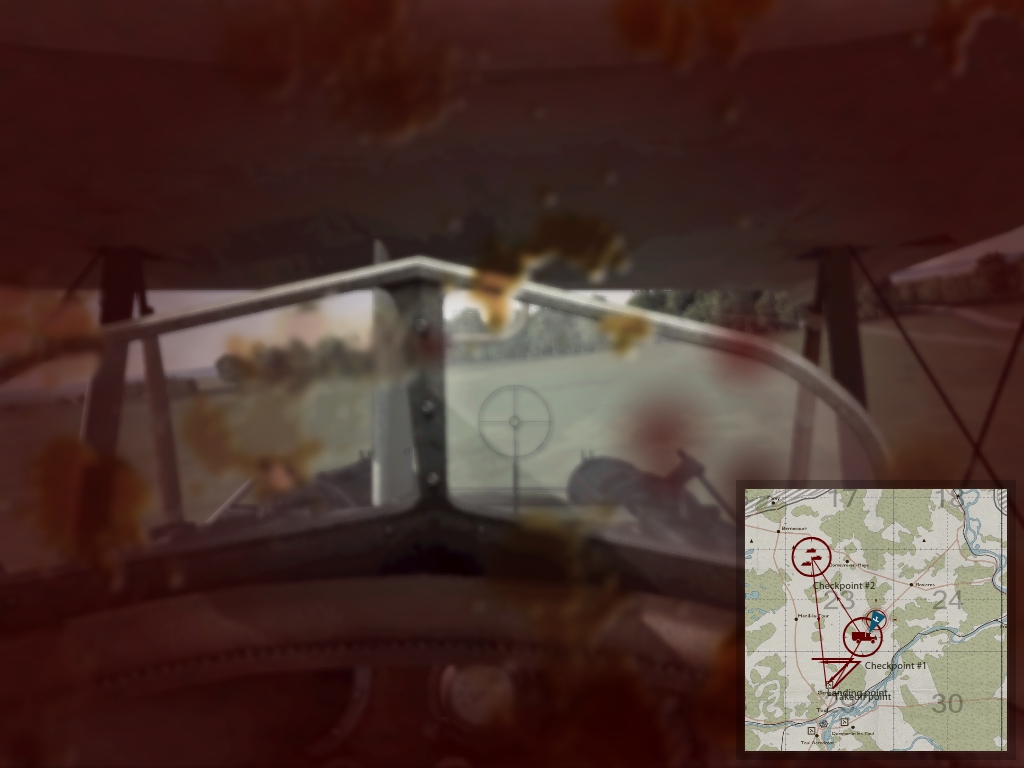
What it looked like inside the cockpit about half a second before...
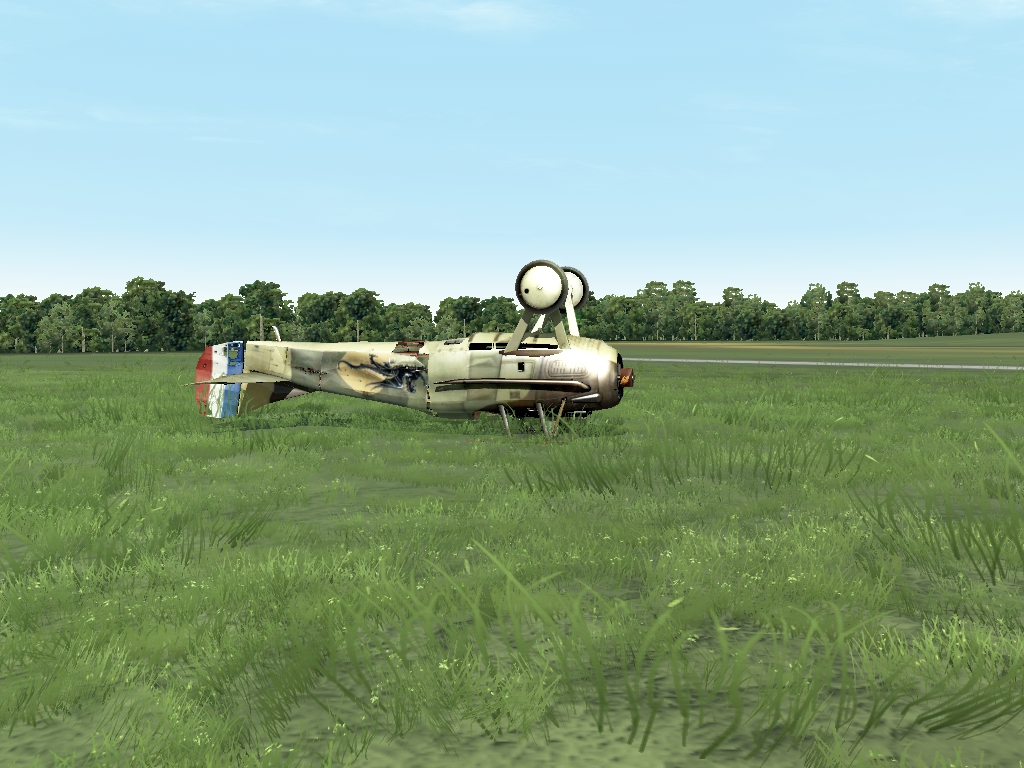
I concentrated too much on the target, not enough on my altitude.
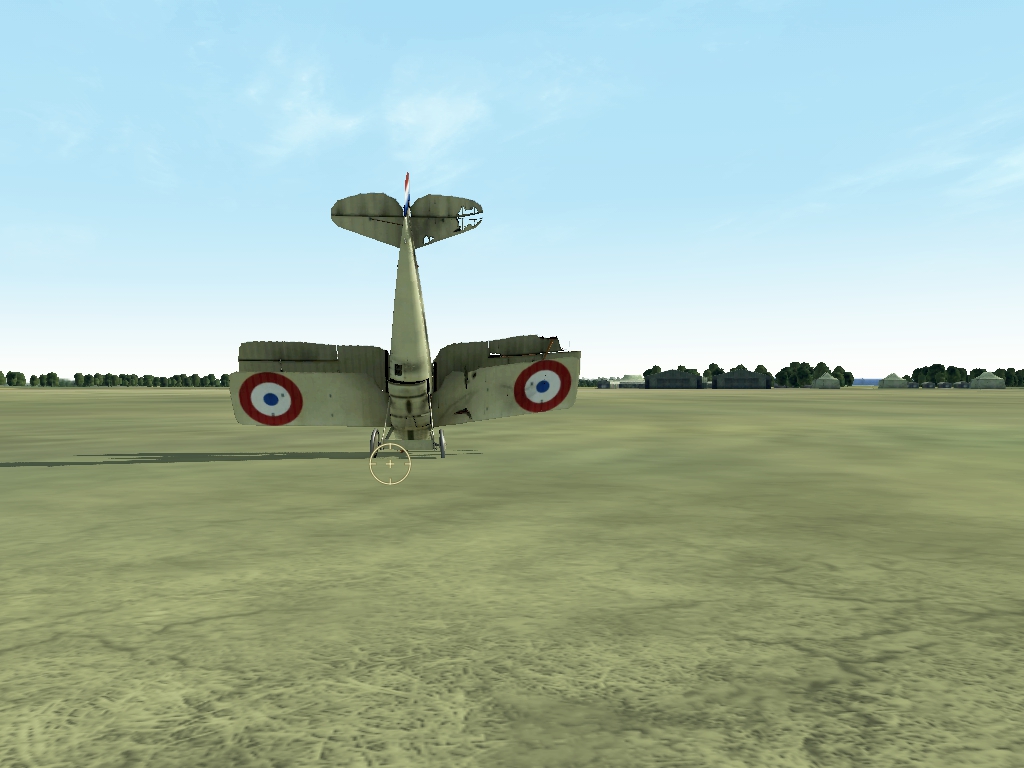
This is what happens when I overconpensate for the engine's radial precession.
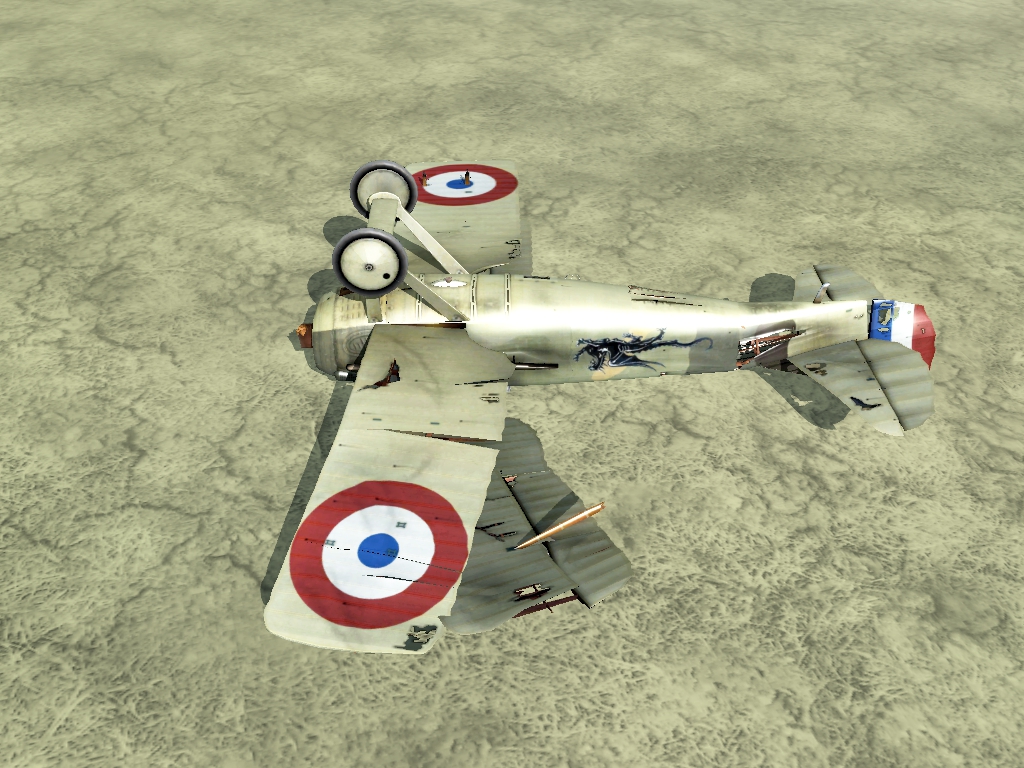
For this one, I tried to take off before I really had enough speed for sufficient lift.
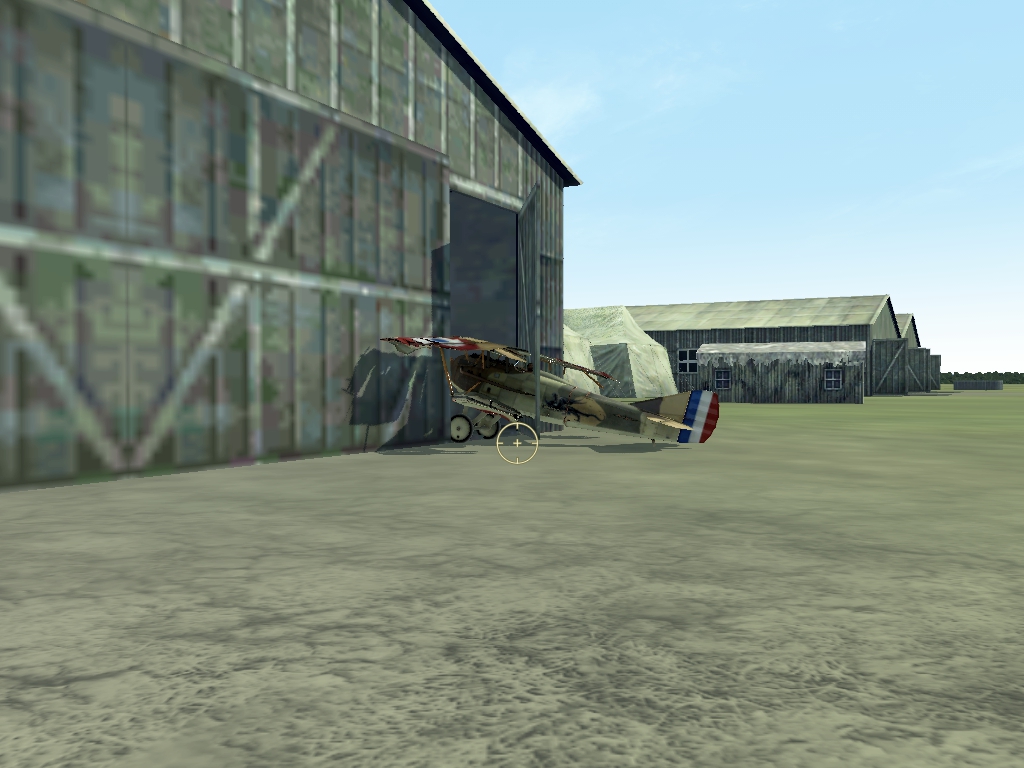
Failure to gain altitude over hangar.
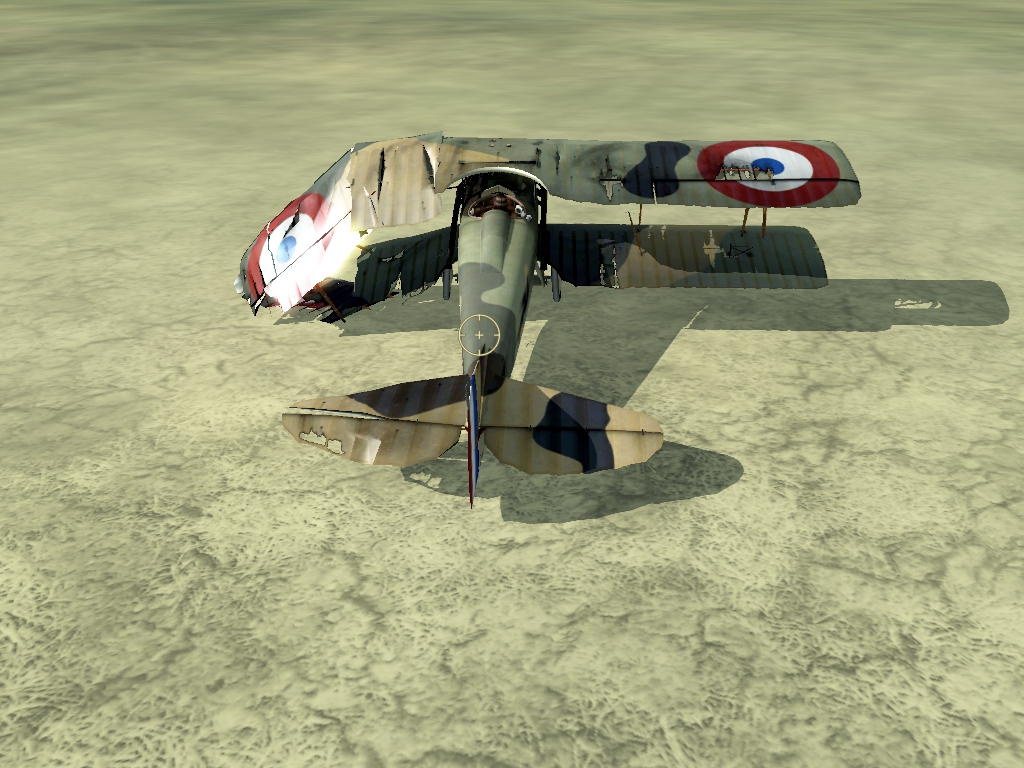
Rocking the plane too much on take off damages the wings.
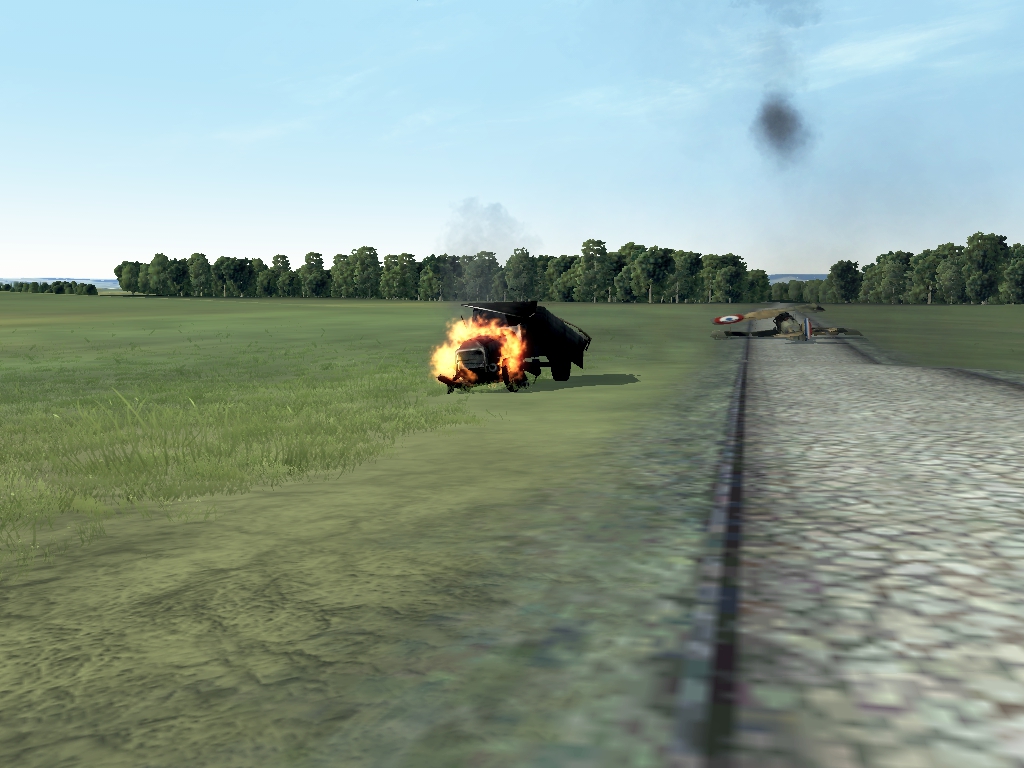
Target Destroyed! But it turns out I have difficulty recovering the plane if I'm ground-strafing from ground level.

Failure to pull up after a strafing run.

Thwacking a tree during a low-level strafe.

What happens when I fail to gain altitude during take off.

What it looked like inside the cockpit about half a second before...

I concentrated too much on the target, not enough on my altitude.

This is what happens when I overconpensate for the engine's radial precession.

For this one, I tried to take off before I really had enough speed for sufficient lift.

Failure to gain altitude over hangar.

Rocking the plane too much on take off damages the wings.

Target Destroyed! But it turns out I have difficulty recovering the plane if I'm ground-strafing from ground level.
It's An Accurate Flight Simulator...
I can tell because I've crashed about five times in each of the training missions. I'm getting the hang of dealing with the radial precession of a rotary engine, so I've made a couple of really good take-offs. Far more often, I wheel madly around the runway, desperately overcompensating to the turns my crate is making. It's not pretty.
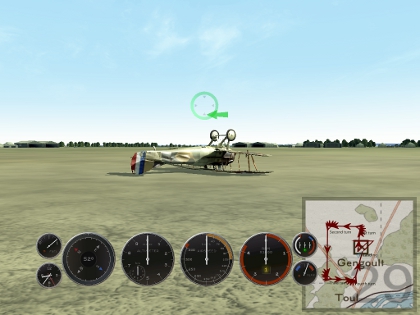
The difference between a flight sim and a flight game is that the sim gives you the plane, warts and all. With modern computer speed and detailed programming, the particular quirks of the aircraft (like shedding its wings in a steep dive) are now being accurately simulated. The flight sim is therefore much more difficult to master, but this also makes it more rewarding in the long run. But right now, I'm at the bottom of the learning curve... and that means a lot of crashing.

The difference between a flight sim and a flight game is that the sim gives you the plane, warts and all. With modern computer speed and detailed programming, the particular quirks of the aircraft (like shedding its wings in a steep dive) are now being accurately simulated. The flight sim is therefore much more difficult to master, but this also makes it more rewarding in the long run. But right now, I'm at the bottom of the learning curve... and that means a lot of crashing.
Monday, May 7, 2012
Tuesday, May 1, 2012
Confessing Another Obsession
I've shared, or perhaps inflicted a number of my obsessions on this blog: Godzilla, Lovecraft, Ancient Egypt, necromancy, The Tomb of Horrors. These are the subjects that I return to again and again. I'm not sure why. I think everyone has these odd little things that they just like for reasons that are buried deep in their psyche.
If you've read my fiction, you'll notice that I have a thing for WWI flight. Open-cockpit flying, the time part of the danger of flight was that your plane might shed its wings. Biplane flight is beautiful. It doesn't isolate you from the fact that you're flying. I don't know where I picked up this particular twist in my psyche, but I've taken several rides in airplanes older than my parents, and loved each one. But that's expensive and inconvenient. When I want to get that feel of flight, I turn to WWI flight sims.
I'm lucky in my obsessions. They're pretty obscure. Whereas there will be several WWII or jet flight sims or games put out in a year, dedicated WWI flight sims tend to be few and far between. Because I obsess about this sort of stuff, I collect them. Old WWI flight sims, new WWI flight sims, the different editions of the same flight sim. I love cataloging them, writing about their differences, analyzing the way the genre has developed and changed.
I was, for example, ecstatic when, in 2005, Atari released their early arcade games on PC. At last, I could play the original Red Baron again!
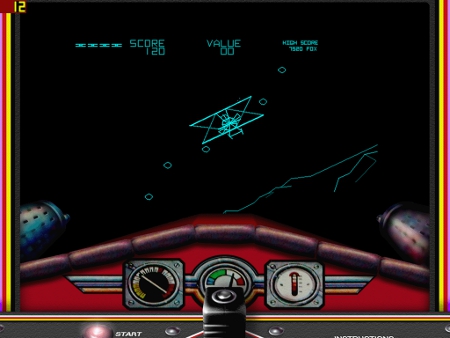
At the same time, I'm keeping up with the most recent WWI flight sims, such as 777 Studio's Rise of Flight, which is quite astonishing in its detail.
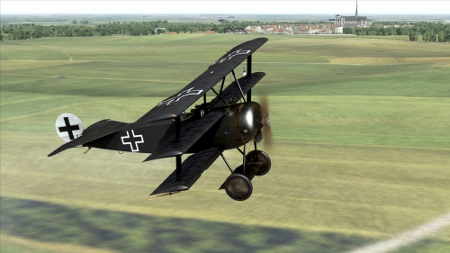
There have been a large number of these sims since 1981. I count about 70. Luckily, a lot of them are out of print or were unpopular, so for less than $20, I can acquire an older piece of software with what are often some very nice manuals. With DOSBOX, I can now play the majority of these. For example, I've acquired Cosmi's War Eagles, which is just about the oldest WWI game I can find for the PC. It came on a 5.25 inch diskette. Remember those?
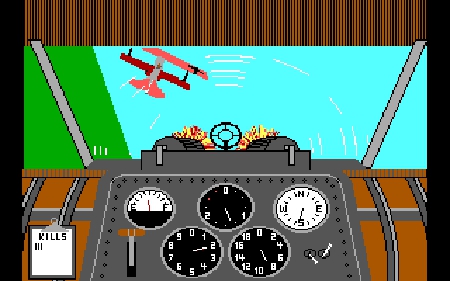
The internet, especially Ebay and Amazon, have been extremely helpful in discovering and locating these older games, especially the really weird and obscure titles like Manfred von Krashenbern’s Flying Circus. And it's really a chuckle to watch these bundles of polygons that the brain somehow translates into flying planes.
Everybody has their little quirks, and this is one of my perennials. Sometimes, I won't touch a flight sim for a year, but I've always come back to them. And I love them all, from the prmitive to the goofy (Red Baron Pizza included a free flight sim in some of their pizzas in 2004. It's hilarious!) to the unforgiving modern sim.
If you've read my fiction, you'll notice that I have a thing for WWI flight. Open-cockpit flying, the time part of the danger of flight was that your plane might shed its wings. Biplane flight is beautiful. It doesn't isolate you from the fact that you're flying. I don't know where I picked up this particular twist in my psyche, but I've taken several rides in airplanes older than my parents, and loved each one. But that's expensive and inconvenient. When I want to get that feel of flight, I turn to WWI flight sims.
I'm lucky in my obsessions. They're pretty obscure. Whereas there will be several WWII or jet flight sims or games put out in a year, dedicated WWI flight sims tend to be few and far between. Because I obsess about this sort of stuff, I collect them. Old WWI flight sims, new WWI flight sims, the different editions of the same flight sim. I love cataloging them, writing about their differences, analyzing the way the genre has developed and changed.
I was, for example, ecstatic when, in 2005, Atari released their early arcade games on PC. At last, I could play the original Red Baron again!

At the same time, I'm keeping up with the most recent WWI flight sims, such as 777 Studio's Rise of Flight, which is quite astonishing in its detail.

There have been a large number of these sims since 1981. I count about 70. Luckily, a lot of them are out of print or were unpopular, so for less than $20, I can acquire an older piece of software with what are often some very nice manuals. With DOSBOX, I can now play the majority of these. For example, I've acquired Cosmi's War Eagles, which is just about the oldest WWI game I can find for the PC. It came on a 5.25 inch diskette. Remember those?

The internet, especially Ebay and Amazon, have been extremely helpful in discovering and locating these older games, especially the really weird and obscure titles like Manfred von Krashenbern’s Flying Circus. And it's really a chuckle to watch these bundles of polygons that the brain somehow translates into flying planes.
Everybody has their little quirks, and this is one of my perennials. Sometimes, I won't touch a flight sim for a year, but I've always come back to them. And I love them all, from the prmitive to the goofy (Red Baron Pizza included a free flight sim in some of their pizzas in 2004. It's hilarious!) to the unforgiving modern sim.
Subscribe to:
Posts (Atom)